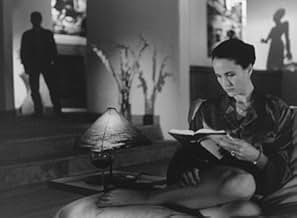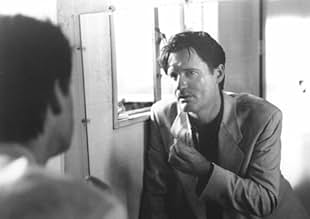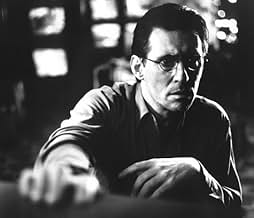CALIFICACIÓN DE IMDb
5.6/10
5.5 k
TU CALIFICACIÓN
Mike es un exitoso productor de Hollywood de películas violentas. Entonces él mismo experimenta una violencia extrema, desaparece, se une a unos jardineros latinos y revisa su vida.Mike es un exitoso productor de Hollywood de películas violentas. Entonces él mismo experimenta una violencia extrema, desaparece, se une a unos jardineros latinos y revisa su vida.Mike es un exitoso productor de Hollywood de películas violentas. Entonces él mismo experimenta una violencia extrema, desaparece, se une a unos jardineros latinos y revisa su vida.
- Premios
- 1 premio ganado y 4 nominaciones en total
Nicole Ari Parker
- Ade Kenya
- (as Nicole Parker)
Samuel Fuller
- Louis Bering
- (as Sam Fuller)
Opiniones destacadas
5=G=
"The End of Violence" is a clutter of stick figures wandering through a messy story about some sci-fi "big brother" government project being tested in Los Angeles. The film trades interesting characters for interesting situations, connects the dots too late revealing too little, and ends in a self absorbed coma about as flat as warm beer. Nonetheless, the film has a respectable cast, a garnish of neo-Beat poetry, a brooding noir feel, a good soundtrack, and some husky-voiced philosophical narration by Pullman making it a par watch for the needy couch potato. (C)
I'm not surprised that a child would not understand this movie. To me it was very meaningful, but only in terms of lived experience in jobs and politics. It's really "Brave New World," where authority figures keep order by putting up cameras everywhere and intervening to eliminate anyone who is disorderly or criminal. Violence is a huge preoccupation, but only tolerated as make-believe -- but the make-believe gets confused with real violence. Control, transgression, power are the pivots of the well-to-do. Ashcroft stuff.
But the Mexican and immigrant families offer a warmer, truer alternative. In the end, they are more powerful because they are free and can think. The Kinko's episode, in which the police are defeated from taking control by their own preconceptions, is a good example. As underlings, laborers, the Mexicans understand what's at stake and they are everywhere, invisible to their employers.
The intellectual technician doesn't catch on until it's too late.
I'm told that what I saw was a re-cut and that the early version was indeed chaotic with a lot of loose ends. All I can say is that now this is one of the videos I rewatch and ponder.
But the Mexican and immigrant families offer a warmer, truer alternative. In the end, they are more powerful because they are free and can think. The Kinko's episode, in which the police are defeated from taking control by their own preconceptions, is a good example. As underlings, laborers, the Mexicans understand what's at stake and they are everywhere, invisible to their employers.
The intellectual technician doesn't catch on until it's too late.
I'm told that what I saw was a re-cut and that the early version was indeed chaotic with a lot of loose ends. All I can say is that now this is one of the videos I rewatch and ponder.
I don't think I've ever seen a movie that is so cerebral yet so poor at the same time. Wim Wenders is certainly revered in the film community for his offbeat ethereal productions (i.e. Wings of Desire), however, nothing profound or comprehensible can be extracted from his latest effort. It is as if four or five scripts were dropped in a studio parking lot by some clumsy intern and what was left was thrown together so that somebody wouldn't get fired. There are some common links between the characters but what does any of it have to do with the underlying plot of satellite surveillance? I kept waiting for the film to decide which plot it thought was most interesting, but it remained undecided to the very end. This was a frustrating experience to say the least.
The most aggravating aspect of this film is the fact that none of the parties involved appear to incompetent, so how is this movie so bad? Maybe I missed something...
The one saving grace of this film is the performance of Udo Kier as a German director. He alone mutters the one or two lines that managed to get me to crack a smile during this disaster.
The most aggravating aspect of this film is the fact that none of the parties involved appear to incompetent, so how is this movie so bad? Maybe I missed something...
The one saving grace of this film is the performance of Udo Kier as a German director. He alone mutters the one or two lines that managed to get me to crack a smile during this disaster.
Wim Wender's The End of Violence is a rather disjointed and uninvolving piece of film-making. It wants to be a tale about how violence affects our lives and how, once exposed to it, we find ourselves fundamentally changed. It might actually succeed if it wasn't busy confusing the audience and boring them to death at the same time.
As the film opens, we are treated to a day in the life of Hollywood producer Mike Max (Bill Pullman), who is busy wheeling and dealing through multiple phones and computer connections, all the while ignoring his wife, Paige (Andie McDowell). While he is out during the day, he is kidnapped by two not quite bright hit men who are killed in a mysterious fashion and Mike Max manages to escape. He is found dazed by some Latino gardeners and Mike decides that he needs to hide from his old life to protect himself while discovering that violence, which he has peddled in action movies, is a bad thing. Meanwhile, Paige has taken over her husbands company in his absence and developed a relationship with a recording artist named Six (K. Todd Freeman) who provides the love she was lacking in her relationship with Mike. Also meanwhile, technical whiz Ray Bering (Gabriel Byrne) is busy putting the finishing touches on a high-tech surveillance system that the government hopes to use to bring violence in the city under control. However, Ray begins to suspect that the system is possibly being used for nefarious purposes and is trying to get someone to listen to him. And yet elsewhere still, stuntwoman turned actress Cat (Traci Lind) is getting her big acting break in Mike's latest film, and she finds herself somewhat smitten with detective Dean Brock (Loren Dean) who is investigating the disappearance of Mike.
As you can probably tell from the above paragraph, The End of Violence has a lot going on. The problem is that little of it is compelling and because the film is busy juggling so many plot threads at the same time, several of them seem like afterthoughts. The subplot featuring Paige's involvement with Six, for instance, has absolutely no emotional resonance for the audience because we barely know these people. The film also takes a lot of side trips to inexplicable scenes where people gather at performance art sessions to get some bigger message across, I guess, but they just end up being pointless and drawing the film out even more.
Wenders manages to suck the life out of most of the scenes in the film. The acting is uniformly wooden and unconvincing, the characters are little more than bodies going through the motions, and the plot is half-explained and developed. Take the plot thread of Ray trying to discover the truth about the surveillance system. It is revealed eventually that he has actually already been in contact with Mike about it with the hopes of revealing the system to the public, but the film has so many pieces moving around that it takes forever to make the connection between those two characters.
The film also features dreaded voice-over monologues that are just silly and pretentious. The anti-violence message, what there is of it, is also heavy-handed, to say the least. In one scene, Six speaks to Mike on the phone and gives us a long explanation about why violence is good and people revel in it. You can practically see Wenders on his soapbox while this scene is going on.
I suppose this movie is supposed to be a thriller to some degree, but there is little that is thrilling about The End of Violence. It is a monotonous bore of a film that comes to a rather abrupt ending without really dealing with all of the issues it seems to want to explore. Instead of an end of violence, I'll take an end to this particular mess.
As the film opens, we are treated to a day in the life of Hollywood producer Mike Max (Bill Pullman), who is busy wheeling and dealing through multiple phones and computer connections, all the while ignoring his wife, Paige (Andie McDowell). While he is out during the day, he is kidnapped by two not quite bright hit men who are killed in a mysterious fashion and Mike Max manages to escape. He is found dazed by some Latino gardeners and Mike decides that he needs to hide from his old life to protect himself while discovering that violence, which he has peddled in action movies, is a bad thing. Meanwhile, Paige has taken over her husbands company in his absence and developed a relationship with a recording artist named Six (K. Todd Freeman) who provides the love she was lacking in her relationship with Mike. Also meanwhile, technical whiz Ray Bering (Gabriel Byrne) is busy putting the finishing touches on a high-tech surveillance system that the government hopes to use to bring violence in the city under control. However, Ray begins to suspect that the system is possibly being used for nefarious purposes and is trying to get someone to listen to him. And yet elsewhere still, stuntwoman turned actress Cat (Traci Lind) is getting her big acting break in Mike's latest film, and she finds herself somewhat smitten with detective Dean Brock (Loren Dean) who is investigating the disappearance of Mike.
As you can probably tell from the above paragraph, The End of Violence has a lot going on. The problem is that little of it is compelling and because the film is busy juggling so many plot threads at the same time, several of them seem like afterthoughts. The subplot featuring Paige's involvement with Six, for instance, has absolutely no emotional resonance for the audience because we barely know these people. The film also takes a lot of side trips to inexplicable scenes where people gather at performance art sessions to get some bigger message across, I guess, but they just end up being pointless and drawing the film out even more.
Wenders manages to suck the life out of most of the scenes in the film. The acting is uniformly wooden and unconvincing, the characters are little more than bodies going through the motions, and the plot is half-explained and developed. Take the plot thread of Ray trying to discover the truth about the surveillance system. It is revealed eventually that he has actually already been in contact with Mike about it with the hopes of revealing the system to the public, but the film has so many pieces moving around that it takes forever to make the connection between those two characters.
The film also features dreaded voice-over monologues that are just silly and pretentious. The anti-violence message, what there is of it, is also heavy-handed, to say the least. In one scene, Six speaks to Mike on the phone and gives us a long explanation about why violence is good and people revel in it. You can practically see Wenders on his soapbox while this scene is going on.
I suppose this movie is supposed to be a thriller to some degree, but there is little that is thrilling about The End of Violence. It is a monotonous bore of a film that comes to a rather abrupt ending without really dealing with all of the issues it seems to want to explore. Instead of an end of violence, I'll take an end to this particular mess.
I watched this movie a few times, and I have met very few people who liked it as much as I did. I see it as an artful expression of all the critical thoughts in philosophy, sociology etc. that show how genocide, ultra-violence and fascist methods of population-control can develop out of all the promises of order, justice and peace the the modern state makes to its citizens. Also, the dialogue has absolutely superb moments, as when Mike the fugitive of the state says to his wife confronts his ex-wife with the words "Who can I turn myself into? Well I see who you turned yourself into...". A lot of people seem to dislike the loose ends and unexplained shifts that the characters make - but I say, in that very absence of rigid structure the film makes a parallel to the manifest ambivalence of modern life as a citizen: Our greatest protector is also our greatest threat.
¿Sabías que…?
- TriviaThere is a scene in the film where we see a live recreation of the painting "Nighthawks" by Edward Hopper.
- ErroresWhen Page is holding Mike at gunpoint she holds the gun upward with the bottom of the handle facing outward and the ammo clip is clearly missing. Yet when Mike exits through the patio door she fires the gun and shatters the glass.
Obviously there was a bullet in the chamber.
- Bandas sonorasBailare (El Merecumbe)
Written, Performed and Produced by Raul Malo
Courtesy of MCA Records, by arrangement with Universal Music
Special Markets
Selecciones populares
Inicia sesión para calificar y agrega a la lista de videos para obtener recomendaciones personalizadas
- How long is The End of Violence?Con tecnología de Alexa
Detalles
- Fecha de lanzamiento
- Países de origen
- Idiomas
- También se conoce como
- El final de la violència
- Locaciones de filmación
- Griffith Observatory, 2800 E Observatory Rd, Los Ángeles, California, Estados Unidos(Multiple interior and exterior scenes; as Ray Bering's workshop. Hillside hike viewpoint just south of observarory)
- Productoras
- Ver más créditos de la compañía en IMDbPro
Taquilla
- Presupuesto
- USD 5,000,000 (estimado)
- Total en EE. UU. y Canadá
- USD 386,673
- Total a nivel mundial
- USD 386,673
- Tiempo de ejecución2 horas 2 minutos
- Color
- Mezcla de sonido
- Relación de aspecto
- 2.35 : 1
Contribuir a esta página
Sugiere una edición o agrega el contenido que falta





































